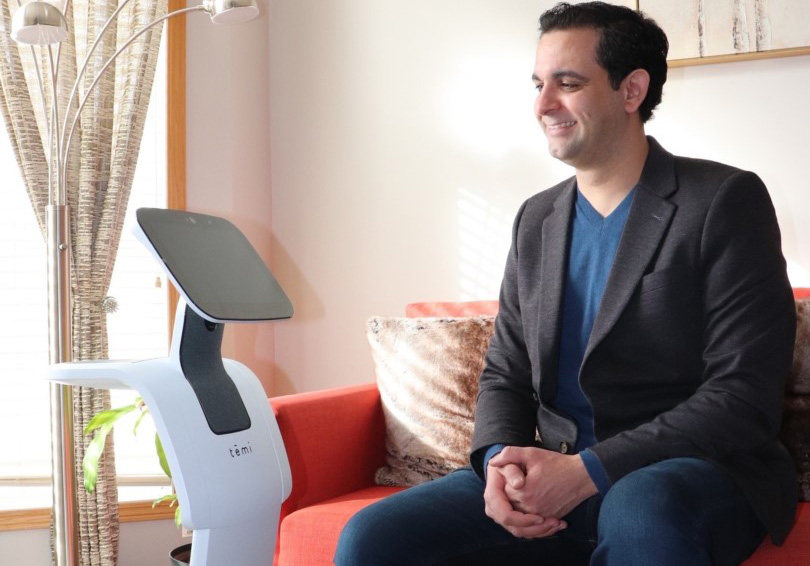
Dr. Amine Choukou, assistant professor of occupational therapy, with one of 15 telepresence robots that will help care for Manitobans living with dementia.
Telepresence robots named for innovation, strength, community
On May 21, Research Manitoba, the Victoria General Hospital Foundation (VGHF) and the College of Rehabilitation Sciences, Rady Faculty of Health Sciences announced the names of 15 telepresence robots that will help care for Manitobans living with dementia as part of a strategic partnership announced last year.
A telepresence robot is a remote-controlled computer, tablet or smartphone-controlled robot, which may include a video-camera, screen, speakers and microphones. This helps the person interacting with the robot to view and hear its operator – often a family caregiver – and the operator can simultaneously view what the robot is “seeing” and “hearing.”
Over 1,500 names were submitted from across the province in a month-long contest held by the three organizations, who each selected five winners. The contest was promoted heavily on various social media platforms, reaching thousands and thousands of Manitobans and beyond.
“We were honoured to receive so many creative and heartfelt ideas from Manitobans of all ages,” said VGHF executive director Charlene Rocke.
Rocke said names were chose to represent the role these telepresence robots would play in the lives of families and in advancing innovation in the province.
“These robots will bring companionship and hope to individuals living with dementia and caregivers in need of support, so we immediately connected to ‘Buddy’ and ‘Hope’ as two of our favourite names.”
Judi Bahl, manager of strategic partnerships at Research Manitoba, said the selection process wasn’t easy, given the significant response.
“There were so many personal or ‘made in Manitoba’ stories that resonated with our team, which made it extremely hard to narrow the overwhelming number of choices down,” she said. “Our organization chose five names that convey power and strength, recognize the community effort and passion associated with the caregivers and family members these robots are meant to support and help, and connect to our commitment to advance research in Manitoba.”
Bahl said one of her favourite names was ‘Koda.’
“The contestant stated that Koda means ‘little bear’ in Cree and noted that bears are strong, smart and protective, which makes this is a perfect name for one of the telepresence robots,” she said.
Dr. Amine Choukou, assistant professor of occupational therapy, said the chosen names had to be easy to remember or relate to the telepresence robot’s ability to provide companionship for the people of Manitoba in need for such innovation.
“I liked the name ‘OLIVE’ because it stands for ‘Online Live Interaction Video Experience.’ It helps explain what the robot does, but it’s also a name that sounds friendly and relatable,” he said.
Choukou is co-leading the two-year project for UM with Dr. Reg Urbanowski, dean of the College of Rehabilitation Sciences.
Urbanowski noted the robots will help people in the community living with dementia, who often require support from informal caregivers.
“Some caregivers sacrifice so much to take care of their loved ones,” Urbanowski said. “We anticipate these robots will help them live healthier, more balanced lives.”
The full list of winners is:
Buddy – Patricia Alison, Winnipeg
Hope – Rebecca Buchanan, Winnipeg
Vic – Melinda Sasek, Winnipeg
Robbie – Barbara Somerville, Winnipeg
Toba – Dea Barrio, Winnipeg
RoSIGMA – Amani Heni, Winnipeg
Spock – Marilyn Kendall, Winnipeg
Winnie – Kathy Watson, Carman
Trakster – Kathy Trakalo, Winnipeg
OLIVE – Richard Pua, Winnipeg
Ally – Cindy Gach, Winnipeg
Koda – Terry Haluik, Winnipeg
Link – Kate Jaworski, Winnipeg
Mani – Vrunda Patel, Winnipeg
Dakota – Lori Ranta Rodrigues, Winnipeg






